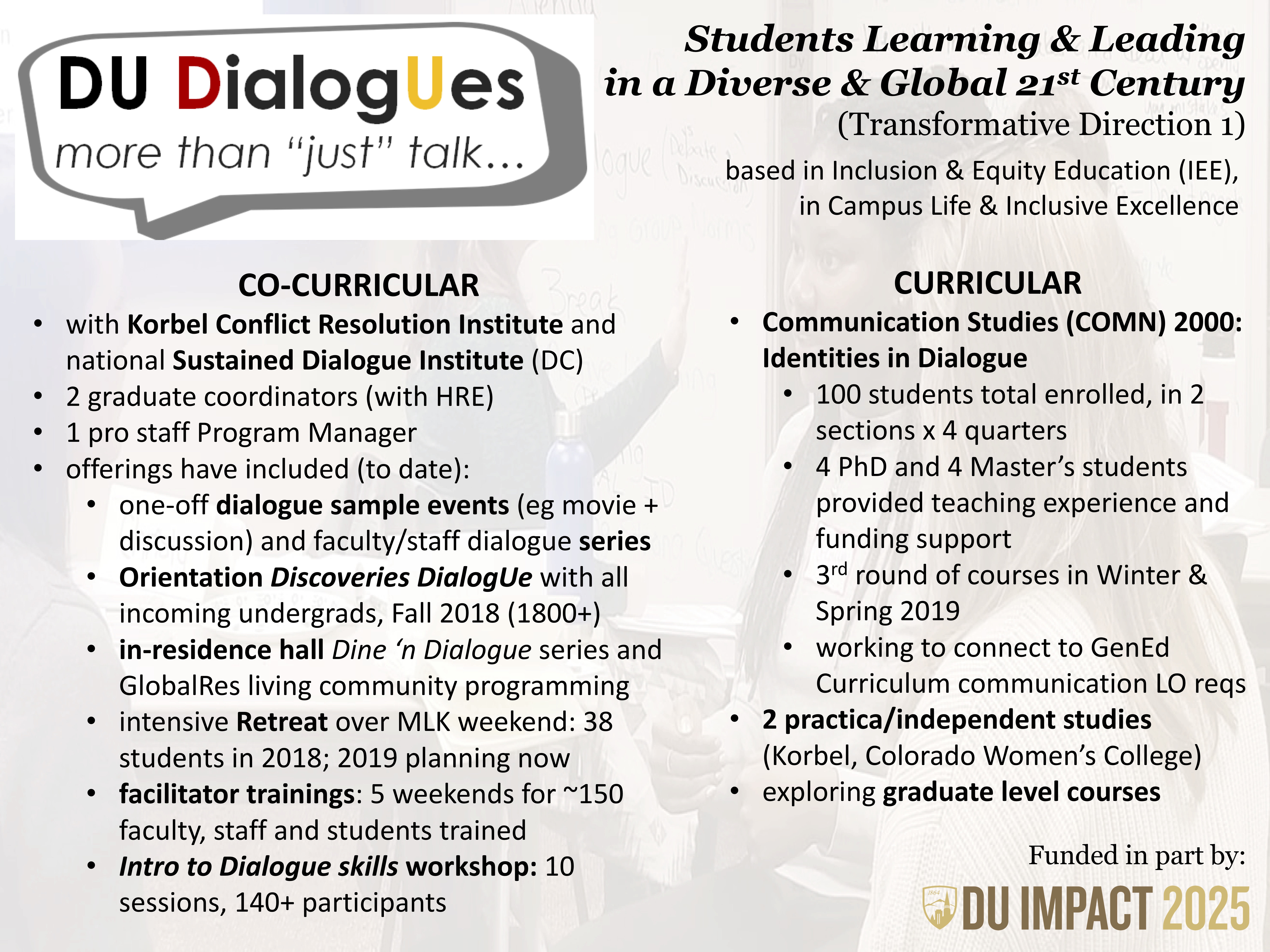DU DIALOGUES
Thomas Walker
Director, Inclusion and Equity Education, Campus Life and Inclusive Excellence
Partners:
Christina Foust
Associate Professor and Chair, Communication Studies, College of Arts, Humanities and Social Sciences
Tamra Pearson d’Estree
Henry R. Luce Professor of Conflict Resolution, Josef Korbel School of International Studies
More than just talk…
Building on past events and programs (such as Voices of Discovery co-curricular dialogues), IEE and the Conflict Resolution Institute are partnering with the Sustained Dialogue Campus Network to add the formal Sustained Dialogues model to DU. Rooted in decades of research and practice, this model gathers small groups for multiple sessions of facilitated discussions, allowing participants to build relationships, reflect on their individual and collective experiences, and increase understanding and collaboration.
Visit the Website to Learn More

Co-Curricular Programming:
- One-off Dialogue Sample Events (eg movie and discussion) and faculty/staff dialogue series
- Orientation Discoveries DialogUe with all incoming grads (Fall 2018 – 1800+ students)
- Residence Hall Dine and Dialogue series and GlobalRes living community programming
- Intensive retreat over MLK weekend (38 students in 2018)
- Facilitator trainings: 5 weekends for roughly 150 faculty, staff and students trained
- Intro to Dialogue skills workshop: 10 sessions, 140+ participants
We are grateful to have the support of 2 graduate coordinators within the Higher Education program, and a program manager on staff.
Curricular Programming:
- Communication Studies (COMN) 2000: Identities in Dialogue
DU faculty and staff, alumni, employers, and students are reporting an increasing need for, and unfortunate lack of, experience engaging critical issues in constructive ways, mirroring broader concerns about weakened communication and conflict management skills in society. We created the pilot course in Winter 2017 to provide students more time and deeper engagement with content and skills than co-curricular workshops could provide.
These small classes (maximum of 20 students) integrate readings, activities, reflective writing, and facilitated dialogue to connect theory and lived experience across intersectional identities, and culminate in a collaborative project. Students enhance their marketable communication skills; deepen their awareness of their own and others’ identities, privileges, and change potential; build alliances toward more inclusive and just communities; and engage real-life issues as experts in their own experience.
Beyond impact on the students enrolled, the courses also provide additional teaching and facilitation experience for two graduate students per section; and the final projects are shared in a campus showcase each quarter, connecting other campus community members to the critical social issues and the potential of dialogue.
Quick Facts:
- 100 students total enrolled, in 2 sections x 4 quarters
- 4 PhD and 4 Master’s students provided teaching experience and funding support
- 3rd round of courses in Winter and Spring 2019
- Working to connect to GenEd Curriculum
- Currently fulfills the performative requirement for Communication Studies majors, the identity and rhetoric requirement for Gender & Women’s Studies, and as an elective for other majors.
Other Curricular Programming:
- Two Practica/Independent Studies through Korbel and Colorado Women’s College
- We are also exploring how to offer similar programming through graduate level courses
Data and numbers as of 12/2018

Recent Comments